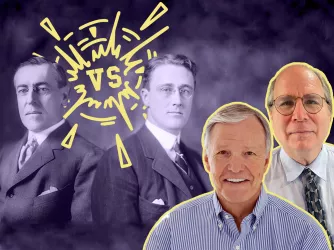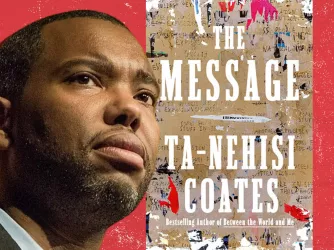Table of Contents
A theater professor wasn’t sufficiently outraged about a list of names on a whiteboard. The college’s next act: probable termination.

CONWAY, S.C., Oct. 20, 2021 — Theater students study the principle of the “willing suspension of disbelief,” meaning that in order to enjoy a show, audience members must suspend their critical thinking and believe that the performance onstage is really happening. To make sense of Coastal Carolina University’s outrageous actions, outside observers will have to suspend their critical thinking as well.
Today, the Foundation for Individual Rights in Education calls on Coastal Carolina to reinstate Dr. Steven Earnest, who was suspended from teaching after criticizing students who protested because they saw the names of students of color written on a whiteboard and mistook the list as malicious. In fact, it turned out to have been a list of students who might want to hang out together.
“I thought I’d seen everything, but my head is still spinning from this case,” said Ronnie London, FIRE’s Faculty Legal Defense Fund vice president. “A professor stands to lose his job for not being sufficiently mad about something that wasn’t meant to cause anger in the first place. Coastal Carolina’s response is not only overly dramatic, but also unconstitutional.”
TAKE ACTION: TELL CCU TO END ITS SUSPENSION OF DR. EARNEST
On Sept. 16, a visiting artist was working with two students of color after class, and one student expressed that she felt isolated and would like to get to know other non-white students in the department. The visiting artist asked about whether it might be helpful for non-white students to connect as a group, and she and the students wrote out the names of other non-white students on the classroom whiteboard while brainstorming ideas.
The names were still on the board when the next class arrived, and several of the entering students were offended, believing that whoever had written the list must have been singling out non-white students.
After discussion with the students and faculty involved, the Department of Theatre’s Diversity, Equity and Inclusion Committee determined that the names on the board had been presented “as a resource for newer students who are looking to be in community with other BIPOC students.” Nonetheless, the DEI committee apologized to the offended students, writing in an email to the theater department that the “faculty and students involved as well as the Theatre Department as a whole are deeply sorry to anyone who was affected by this incident.” The visiting artist who helped create the list of names also apologized profusely, calling her participation “thoughtless and careless.”
Earnest did not agree. He responded to the email, stating (as written): “Sorry but I dont think its a big deal. Im just sad people get their feelings hurt so easily. And they are going into Theatre?” He received several responses criticizing his remark, and responded again to clarify that he was “just defending our guest artist.”
Students critical of Earnest’s emails accused him of being racially insensitive and dismissive of students of color. Several also called for Earnest to be fired and protested by boycotting theater classes, holding a protest in a campus courtyard.
“It was upsetting to be accused of racism by students and others with whom I have never interacted,” said Earnest. “But it was even more upsetting to have these false accusations ratified by a university that I have called home for over fifteen years.”
On Sept. 20, Claudia Bornholdt, the dean of Coastal Carolina’s College of Humanities and Fine Arts, told Earnest not to come to his classes and to send her his syllabus, effectively suspending him from his teaching duties.
Earnest contacted FIRE and is now working with the Faculty Legal Defense Fund to defend his rights. FLDF provides free legal assistance to faculty at public universities whose civil liberties are in jeopardy. Launched this year, it has successfully worked (and is still working with) over a dozen faculty members whose rights or livelihoods have been threatened by their public universities.
“I hope my story can salvage some measure of integrity in higher education,” said Earnest. “Universities must give more weight to the devastating, long-term effects of their actions on hard-working career academics like myself than they do to the short-term pleasure of being perceived as ‘right’ in the eyes of a small but vocal group of students.”
FIRE wrote to Coastal Carolina on Sept. 29, reminding the university that professors have the right to speak freely on matters of public concern. Additionally, the fact that others found Earnest’s emails offensive does not diminish the emails’ protection under the First Amendment. As a public institution, Coastal Carolina is bound by the First Amendment and required to protect the free speech of its faculty.
FIRE received no response to its letter, but Earnest’s attorney told FIRE that rather than backing down, the university is launching a termination process against Earnest.
“If it’s curtains for Earnest, that means it’s act one for a lawsuit,” said FIRE attorney Adam Steinbaugh. “And Coastal Carolina has already decided to be the villain.”
Join us in calling on the university to live up to its First Amendment obligations by immediately reinstating Dr. Earnest:
The Foundation for Individual Rights in Education (FIRE) is a nonpartisan, nonprofit organization dedicated to defending and sustaining the individual rights of students and faculty members at America’s colleges and universities. These rights include freedom of speech, freedom of association, due process, legal equality, religious liberty, and sanctity of conscience — the essential qualities of liberty.
CONTACT
Katie Kortepeter, Media Relations Associate, FIRE: 215-717-3473; media@thefire.org
Michael T. Benson, President, Coastal Carolina University: 843-349-2002; president@coastal.edu
Claudia Bornholdt, Dean of the College of Humanities and Fine Arts, Coastal Carolina University: bornholdt@coastal.edu
UPDATE (December 9, 2021): FIRE updated this press release to correct the timing of a campus protest, which happened after Dr. Earnest wrote the email critical of students protesting the list of names. The timing of the protest does not affect FIRE's defense of Dr. Earnest.
Recent Articles
FIRE’s award-winning Newsdesk covers the free speech news you need to stay informed.

Wilson vs. FDR: Who was worse for free speech?
Podcast
Woodrow Wilson or Franklin D. Roosevelt: which president was worse for free speech? In August, FIRE posted a , arguing that Woodrow Wilson may be America's worst-ever president for free speech. Despite the growing recognition of Wilson's...

Right, left, and in-between: Can we bring our differences to the table?

How to survive Thanksgiving
